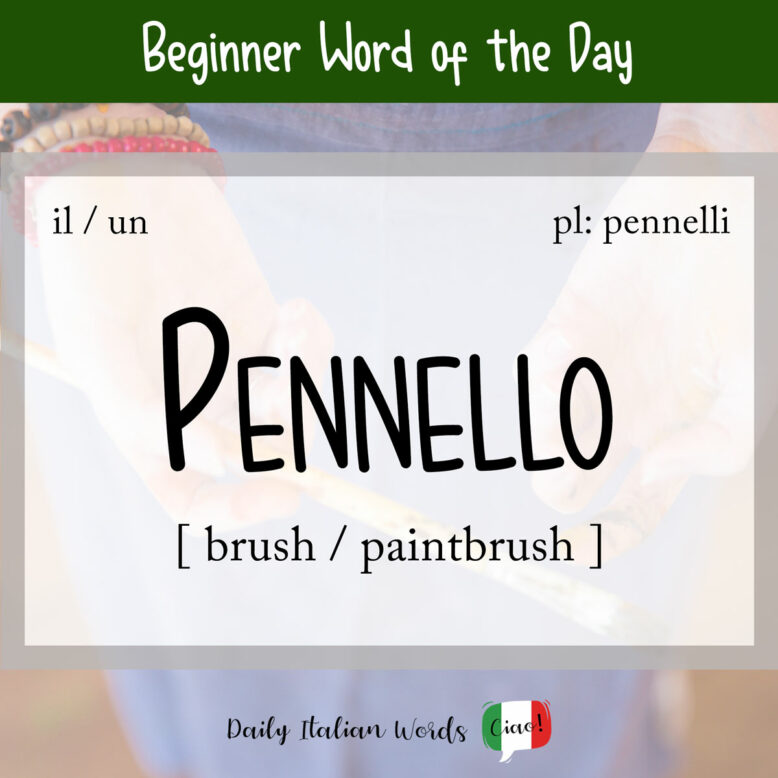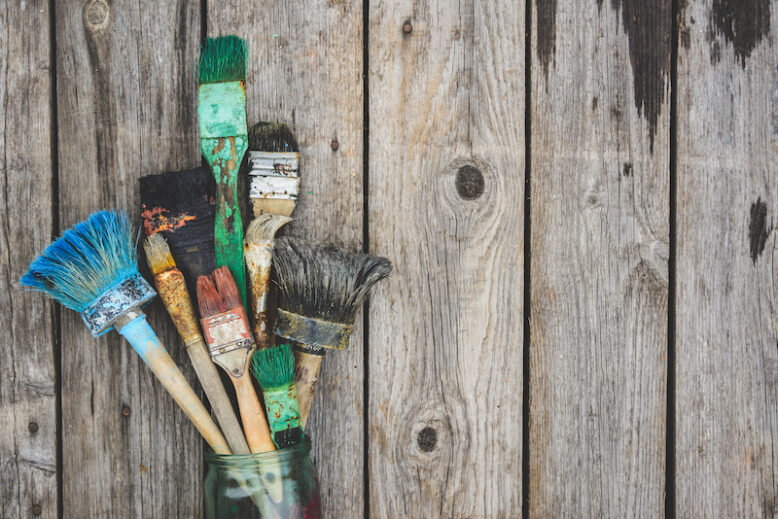Pennello is the term in Italian for any kind of small brush used for applying paint or dye to a surface. It comes form the Latin penellus, which is the diminutive of penis (‘tail’).

Pennello is a masculine noun, and it is used with the following articles:
- il pennello = the paintbrush
- un pennello = a paintbrush
- i pennelli = the paintbrushes
- dei pennelli = (some) paintbrushes
If the brush is designed for an artist, it is called un pennello da pittore (painter’s brush), whereas a brush used by a person whose job is to paint buildings is called un pennello da imbianchino.
Ho intinto il pennello nel barattolo di vernice.
I dipped the brush into the paint can.
Some other kinds of brushes that fall into the category of pennello include:
- il pennello da catrame = tar brush
- il pennello da barba = shaving brush
- il pennello per dolci = pastry brush
- il pennello da colla = glue brush
By extension, pennello can also refer to a painter (e.g. un pennello bravissimo = a great painter), the art of painting, or a particular painter’s style of painting (e.g. il pennello di Monet = Monet’s painting style).
Ha deciso di dedicarsi al pennello dopo una lunga carriera come fotografo.
He decided to devote himself to painting following a long career as a photographer.

The expression a pennello means perfectly. When used in reference to the fit of an item of clothing, the best translation would be to fit like a glove or to suit (someone) to a T.
Questa maglietta ti sta a pennello!
This shirt suits you to a T!
Pennello is also the word for a groin (also spelled groyne), as in a barrier built out to sea from a beach to check erosion and drifting.

In the world of sports, un tuffo a pennello (also known as un tuffo a candela) refers to the act of diving into the water in a standing position with your feet together.
Pennello grande vs. Grande pennello
Below you can watch a TV commercial which my husband saw hundreds of times as a kid. It was made for Cinghiale, a brand that produces brushes of all sizes. It is one of the most iconic TV commercials of the eighties in Italy.
A painter is cycling with a massive brush on his back, causing chaos in the busy street. When a policeman stops him, the painter delivers the iconic line “Devo dipingere una parete grande, ci vuole il pennello grande!” (I need to paint a big wall, so I need a big brush!), to which the officer responds with another iconic phrase: “Non ti serve un pennello grande, ma un grande pennello: Cinghiale!” (You don’t need a big brush, but a great brush: Cinghiale).
The ad plays with the placement of the adjective grande: put after pennello, it describes its size, but put before, it actually means it’s a good brush, as in well-made and reliable. This change in meaning depending on the placement is common among certain adjectives in Italian as you can see below:
- una donna grande = a big woman
- una grande donna = a great woman
- una vecchia amica = an old friend (as in a friend you’ve know for a long time)
- un’amica vecchia = an old friend (as in a friend who is elderly)
- un pover’uomo = a petty man
- un uomo povero = a man who is poor
- un alto giudice = an important judge
- un giudice alto = a tall judge
Note that this doesn’t work with all adjectives. For example, you can say una bella dormita (a good sleep) but not una dormita bella. In other cases, the meaning doesn’t really change, as in the case of un bel film / un film bello.
Heather Broster is a graduate with honours in linguistics from the University of Western Ontario. She is an aspiring polyglot, proficient in English and Italian, as well as Japanese, Welsh, and French to varying degrees of fluency. Originally from Toronto, Heather has resided in various countries, notably Italy for a period of six years. Her primary focus lies in the fields of language acquisition, education, and bilingual instruction.


